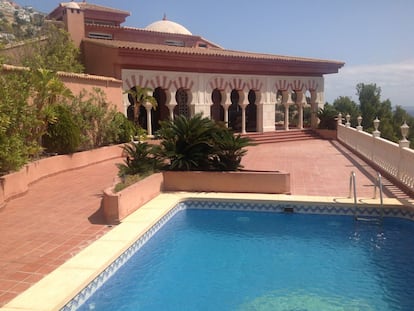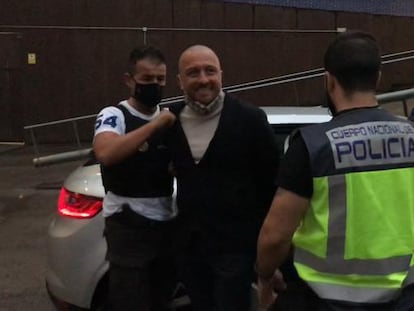Why Italian mafias are setting up home in Spain
Experts say the country’s strategic position, cultural similarities with Italy and more lenient prison system are among the reasons why criminal groups are laying down roots
Spain is a second home to many criminal groups, in particular the Italian mafia. The recent arrests of two mafia bosses highlight this trend. At the beginning of August, Domenico Paviglianiti, a high-ranking member of the ‘Ndrangheta mafia group, was arrested in Madrid, where he had been hiding after being wrongly released from prison in Italy. Just two days later, Maria Licciardi, a top boss from the Camorra criminal organization, was detained on her way to Málaga in Spain’s Costa del Sol. Italian mafia groups have taken root in Spain and helped turn the country into a laboratory of organized crime.
For some time, Italian investigators have been warning of this growing interest in Spain, in particular from the ‘Ndrangheta and Camorra mafia groups, which control cocaine trafficking in Europe. But although it is not a new phenomenon, the coronavirus pandemic has given the Italian mafia an opportunity to deepen their links to Spain. The Italian public prosecutor Palermo Francesco Lo Voi says that the criminal organizations will take advantage of the economic crisis caused by the pandemic to buy up bankrupt businesses in the tourism sector across Europe, but particularly those along the Spanish coast and in France.
Spain is a great bazaar for drug trafficking, where the interests of many criminal organizations come togetherAntonio Nicaso, expert in the ‘Ndrangheta mafia
“Crises are always an opportunity, especially for those who have enormous sums of money to invest and spend, like the mafia,” says Gian Maria Fara, the president of the Institute of Political, Economic and Social Studies (Eurispes), which is based in Rome. “The mafia has acquired business capacity and the mentality of a holding company.”
Investment is the best way for the mafia to hide money from the drug trade in the legal economy. This is especially true for investment in the property market or the tourism sector, with hotels bought via ghost companies or frontmen. In most of Europe, they are not overly complicated operations. “It is an advantage for criminals and a problem for those who fight them,” says Antonio Nicaso, an esteemed expert in the ‘Ndrangheta mafia from Calabria. “Property in the mind of the narcos continues to be a reserve of assets that guarantees they do not lose their initial investment.”
As for why the Italian mafia has set its sights on Spain, there are various factors, say experts. “Spain is a great market for drug trafficking, where the interests of many criminal organizations come together,” explains Nicaso. “We became aware of [Spain’s] strategic importance during the first lockdown [in March 2020 due to the coronavirus pandemic], when a kind of diversification in the drug routes was detected. While fewer shipments arrived in Italy, the deliveries multiplied in Spain.”
Indeed, Spanish police confiscated thousands of kilos of hashish and cocaine between March and May 2020, when the country was in the first wave of the pandemic. These drugs were seized in coastal areas such as Cádiz, Algeciras, Galicia, Valencia, Barcelona and Málaga. “There are those who say the Costa del Sol could be defined as the ‘cosca del Sol’,” says Sales, in reference to the Italian word to describe mafia groups.
The cultural affinity with Spain is another draw for Italian criminal organizations. “The fugitives from the Italian justice system see Spain as a welcoming place, where they understand the language and can bring their families over easily,” explains Isaia Sales, a writer and history professor on the Italian mafia, specializing in the Camorra.
Strategically too, Spain is one of the most important countries for drug trafficking and one of the main gateways for cocaine from South America and hashish from Africa to enter Europe. “Spain guarantees contacts with those who manage the Colombian drug trade,” says Nicaso. “The mafias meet on Spanish soil to define and close negotiations, seal alliances, plan the distribution of the goods through Europe and manage the immense profits from drug trafficking.”
According to Nicaso, Spain is also “a kind of laboratory for organized crime, where groups exchange experiences and carry out experiments, such as the increasingly frequent trade of Moroccan hashish for Colombian cocaine.” While the Italian mafia engages in bloody gang wars back home, in Spain, they are allies and work together. “They are considered entrepreneurs going to do business overseas,” explains Sales. “Violence is used in Italy, while calm reigns in Spain. It is a key condition to maintain calm and go undetected.”
Another factor is the fact that Spain is considered to have a more flexible prison system than Italy, where mafia bosses are placed in near isolation. Indeed, Camorra mafia leader Maurizio Prestieri, who was arrested in Marbella in 2003 and spent four years behind bars, defined Spanish prison as “a city of all-inclusive vacations.”
Mafia bosses in Spain
A number of mafia bosses have been arrested in Spain in recent years. This list includes Raffaele Amato, who was nicknamed ‘The Spaniard’ because he controlled the cocaine trade between Galicia and Italy; Pasquale Brunese, who hid in Valencia and worked in a seaside restaurant under a false name; and Lucio Morrene, who was arrested while heading to take out money from a post office in Benalmádena.
But Fara warns that the fact that the ‘Ndrangheta boss Paviglianiti was arrested in Madrid “indicates that the mafias have infiltrated the territory.” “There is a control, a protection network that allows leading figures to hide. This is happening in the heart of Europe, not in incomparable places where the degree of attention and control is much less, like in Latin American countries for example,” he explains.
Italian prosecutor Nicola Gratteri agrees that the problem of the mafia is not restricted to Italy, but rather a “European drama.” “Europe is not up to the task of fighting the mafia and money laundering. If I leave Italy with two suitcases filled with money and go to another country and buy a car for €80,000 in cash and return to Italy, no one is going to ask me where I got the money from,” says Gratteri, who has opened in Calabria the largest operation against organized crime in Italy since the 1980s. “The rest of the [European] states don’t want to recognize that there are mafias there. Saying that there are mafias means discouraging foreign investment,” he adds.
The deputy head of the Italian police force, Vittorio Rizzi, recently announced that Italy had invited EU members to Rome to learn from the country’s experience in fighting the mafia: “The arsenal of instruments that our country has is very effective. The problem is seeing what will happen in other nations and if they are prepared to bear this attack.”
English version by Melissa Kitson.









































